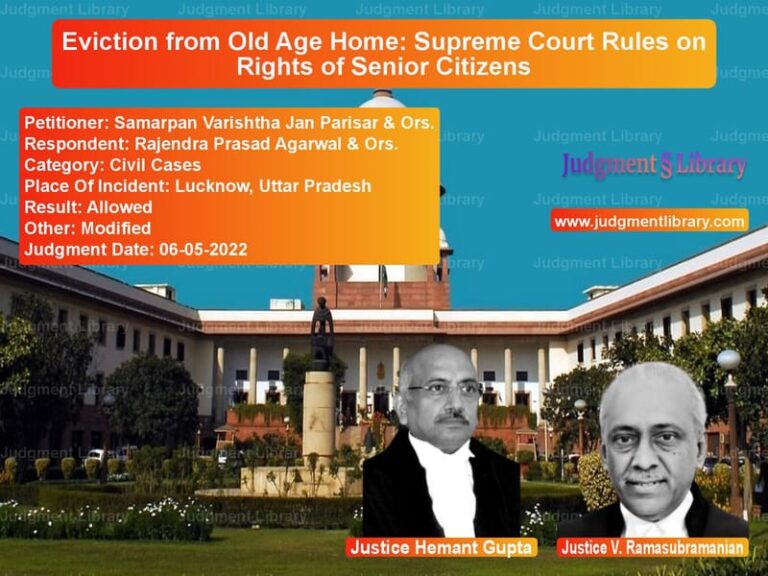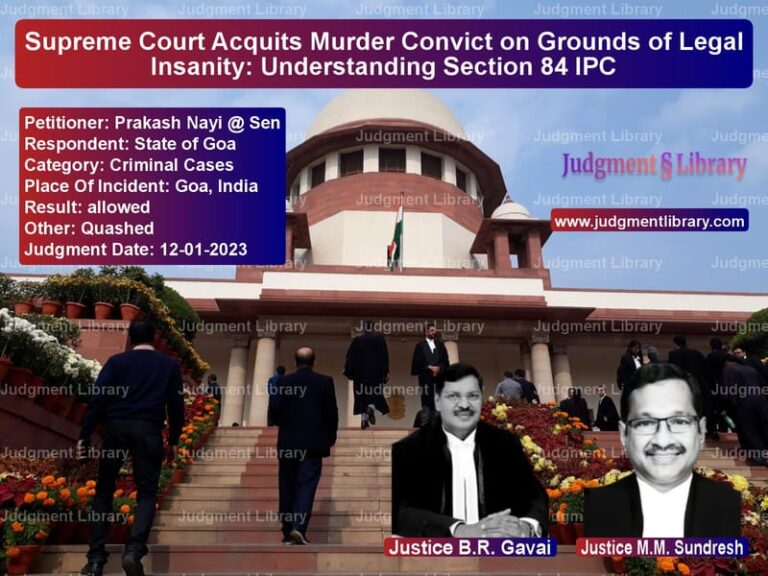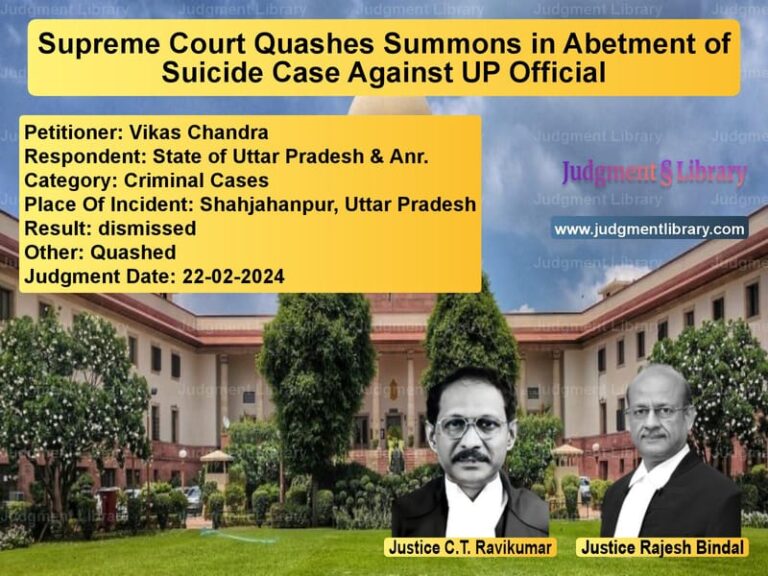Supreme Court Upholds Acquittal in 1998 Murder Case Due to Unreliable Witness Testimony
The Supreme Court of India recently adjudicated an appeal filed by the State of Punjab against the acquittal of Paramjit Singh in a murder case. The case revolved around the killing of an individual on December 22, 1998. The High Court of Punjab and Haryana had previously overturned the trial court’s conviction, acquitting the accused. The State of Punjab challenged this decision before the Supreme Court.
Background of the Case
The prosecution’s case was based on two key pieces of evidence:
- The testimony of an alleged eyewitness, Balwinder Singh (PW-7).
- An alleged extra-judicial confession made by the accused to Sikandar Singh (PW-8), a former village sarpanch.
On the basis of these testimonies, the trial court convicted Paramjit Singh under Section 302 of the Indian Penal Code (IPC) for murder. However, the High Court found significant inconsistencies in the evidence and overturned the conviction, leading to an appeal by the State.
Supreme Court’s Analysis
Unreliability of the Eyewitness Testimony
The Supreme Court thoroughly examined the evidence of PW-7 Balwinder Singh and concurred with the High Court’s reasoning that his testimony was unreliable. The Court pointed out:
“The reasons recorded by the High Court for discarding his testimony are cogent reasons. It has come in the evidence of PW-7 that after the incident, the witness did not complain to the police. Moreover, he knew a close relative of the deceased Surjan Singh who was available on phone. However, PW-7 did not inform him.”
Further, Balwinder Singh admitted during cross-examination that after witnessing the crime, he went back home instead of immediately reporting the incident. He passed a police station but did not inform the authorities. It was only the next morning, upon receiving a call from Surjan Singh, that he decided to go to the scene of the crime. The Supreme Court found his conduct to be unnatural and raised doubts about the credibility of his statement.
Suspicion Over the Extra-Judicial Confession
The prosecution’s second key witness was PW-8 Sikandar Singh, who claimed that the accused confessed to the crime nearly two weeks after the incident. The Court found this assertion dubious:
“PW-8 Sikandar Singh has not stated that he had previous acquaintance with the respondent. Even otherwise, there is no evidence adduced by the prosecution to show that the respondent-accused closely knew PW-8 so that he could have reposed implicit faith in him and confessed about the alleged incident.”
The Supreme Court observed that it was highly unlikely that an accused person would confess to a stranger after such a long period. The prosecution failed to provide any explanation as to why the accused would choose to disclose such a crime to someone with whom he had no close relationship.
Delay in Arrest and Other Doubts
The prosecution claimed that PW-7’s statement was recorded on December 23, 1998, the day after the incident. However, PW-9 ASI Baldev Singh, the investigating officer, did not confirm this claim. Further, despite the alleged eyewitness testimony, the accused was not immediately arrested, adding to doubts about the case.
Supreme Court’s Decision
The Supreme Court ruled that the High Court’s acquittal of Paramjit Singh was based on reasonable doubt regarding the prosecution’s case. The Court held:
“The findings recorded by the High Court are possible findings which could have been recorded on the basis of the evidence on record. Hence, no case for interference is made out. The appeal is accordingly dismissed.”
As a result, the Supreme Court upheld the acquittal, affirming that the evidence against the accused was insufficient to sustain a conviction.
Conclusion
This case highlights the importance of reliable witness testimony and the principle that an accused cannot be convicted based on weak or doubtful evidence. The Supreme Court’s decision reinforces the necessity of proving guilt beyond a reasonable doubt, ensuring that no person is wrongfully convicted based on unreliable witness accounts.
Petitioner Name: State of Punjab.Respondent Name: Paramjit Singh.Judgment By: Justice Abhay S. Oka, Justice Sanjay Karol.Place Of Incident: Punjab.Judgment Date: 02-08-2023.
Don’t miss out on the full details! Download the complete judgment in PDF format below and gain valuable insights instantly!
Download Judgment: state-of-punjab-vs-paramjit-singh-supreme-court-of-india-judgment-dated-02-08-2023.pdf
Directly Download Judgment: Directly download this Judgment
See all petitions in Murder Cases
See all petitions in Judgment by Abhay S. Oka
See all petitions in Judgment by Sanjay Karol
See all petitions in dismissed
See all petitions in supreme court of India judgments August 2023
See all petitions in 2023 judgments
See all posts in Criminal Cases Category
See all allowed petitions in Criminal Cases Category
See all Dismissed petitions in Criminal Cases Category
See all partially allowed petitions in Criminal Cases Category







